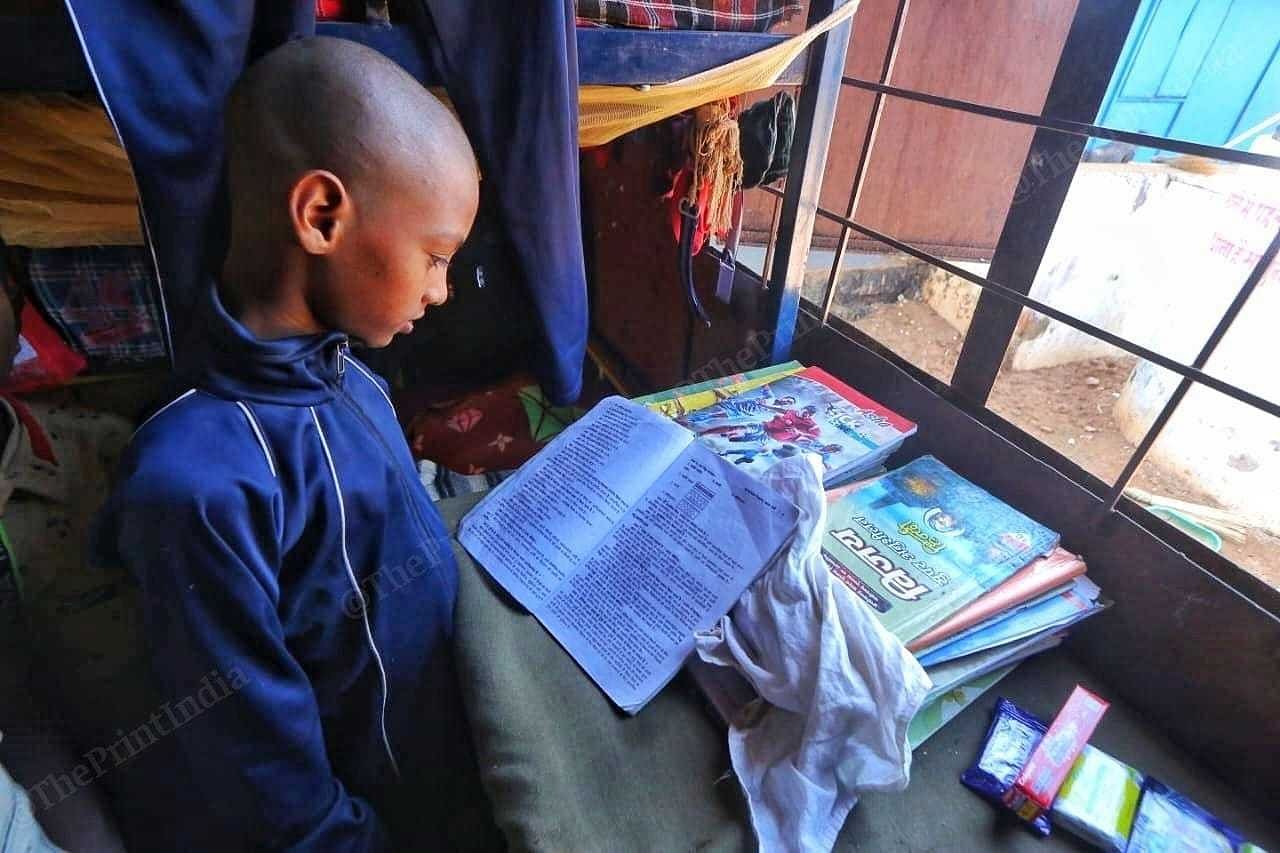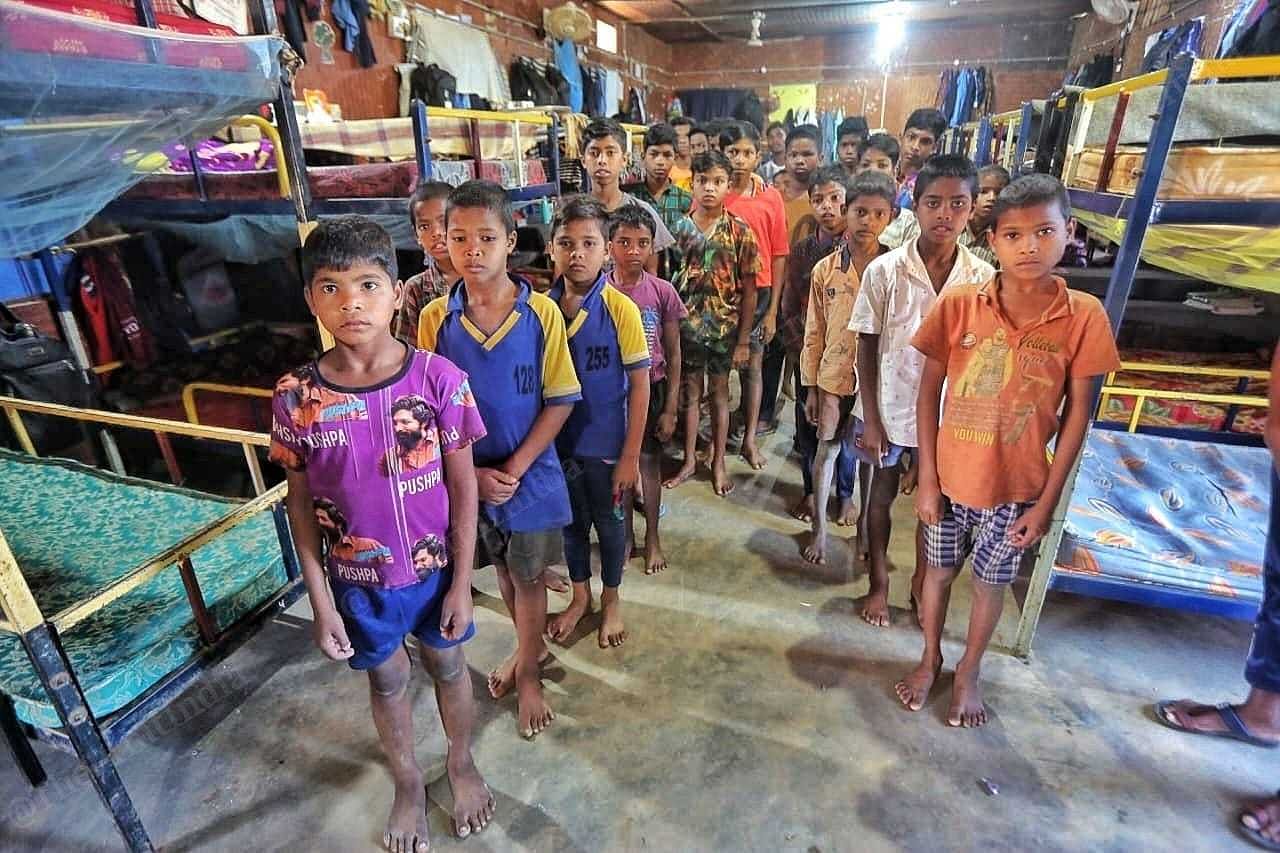Orchha, Chhattisgarh: It’s Sunday. The afternoon sun is shining down as the sound of children playing football is heard in the bamboo portacabin classroom.
Fourteen-year-old Rinku Kumar sits gazing intently at his biology textbook, oblivious to the shouts and laughter outside. On the open page in front of him is a picture of a human heart.
Rinku lives in Kongera village in Bastar, Chhattisgarh – a place where healthcare is non-existent. He says he wants to be “an all-round doctor who is accessible, knows the human body well, and can heal anyone”.
The idea came to him at the age of 7, when he saw his elder brother and some friends die of a disease that went undiagnosed due to poor access to healthcare. Other villagers put the deaths on a “curse” and move on. But Rinku could not.
Today, he is one of 570 boys studying at the Portacabin School (there are other such schools for girls too) in Orchha, a village in Narayanpur district. Run by the Bhupesh Baghel-led state government, the ‘Orchha Porta Cabin Residential School’ – a series of portacabin structures – grouped together – caters to children from remote villages around Abujhmad, a densely forested Naxal area where very few or no connectivity.
The Portakabin School initiative, started in 2012, aims to provide education to the state’s tribal communities, mostly Gonds and Halbis. No fee is charged by these schools.
In a state grappling with Left Wing Extremism, poor road connectivity and inadequate education facilities, these residential schools with classes from Grade 1 to 10 come as a relief.
Narayanpur Collector Ajit Vasant told ThePrint that the idea behind the initiative is to make education accessible, not only in areas where schools were destroyed in Naxalite violence, but also for tribal children living in remote areas of the state .
There are two such schools in the district. The one in Orchha opened in 2013.
“Earlier, schools were located in remote places with no electricity, few teachers, and where students had to walk miles for education. Here we bring them all together to provide them with anything including food and clothes. They don’t have to worry and they can just focus on their studies,” says Vasanth.
The schools follow the State Council of Educational Research and Training (SCERT) curriculum and all school staff – from teachers and hostel wardens to cooks and sanitation workers – are recruited by the state education department.
The schools have both permanent staff and ad hoc appointees, and for students like Rinku, they provide an opportunity for a better life.
“Our people live in villages where there are no doctors. So many people fall ill but no one knows what has happened to them,” he says. “They are simply put in the shed and then they die. I want to become a doctor so that I can help my people to live more. That’s why biology is my favorite subject.”
Read also: Tribal identity, ST status, politics – what is fueling anti-Christian attacks in Chhattisgarh
treacherous ways
Getting students to school is a challenging task. For this, teachers and local volunteers embark on perilous routes that include long walks and crossing rivers. Their journey from village to remote village could take several days.
And then there is the job of convincing the parents, most of whom are farmers.
“These are volunteers who know Gondi and Halbi. We go to villages and educate parents about the merits of portacabin schools for their children,” says warden Ram Kishor Kurram Orchha School, speaking to ThePrint.
He adds: “We are also in regular touch with various anganwadi workers, who tell us about villages that have children of school-going age. So we plan to visit those villages. We also tell the parents who come to drop off their children so that this can be publicized.
Though the medium of instruction is Hindi, lessons are also conducted in Muria – the language of the local tribes – for classes 1 to 3.
“Most of the children do not have knowledge of Hindi, so from class 1 to 3 we take classes in both Hindi and Muria till they become comfortable with Hindi. But they pick up Hindi very quickly because they live with children who know the language. By the time they reach class 3, they know it very well,” Tamesh Vike, a teacher Orchha The school tells ThePrint.
The schools help in preparing the students not only for higher education but also for various competitive exams.

“From class 5 onwards we train children so that they can go to Eklavya, Navodaya Vidyalaya, Ramakrishna Mission School or any other higher education institution. Our aim is to strengthen their basic foundation, create an interest in studies, and then they do the rest.
Whereas Eklavya Vidyalaya were started in 1997-98 to provide quality education to tribals in remote parts of the country. Jawahar Navodaya Vidyalayas are residential schools that primarily provide education to children from rural backgrounds.
The students come from underprivileged backgrounds and have a hunger for education and to make something of their lives, says Verma.
Like Rinku, many students want to become doctors and science remains their favorite subject. Therefore, the school is working on arranging a science laboratory along with a television equipped with video conferencing and other communication facilities.
Participation in sports is also encouraged. Orchha school warden Kurram says, “Many of our children have also been selected for state-level tournaments in kho-kho, kabaddi, volleyball and cricket.”
giving back
It takes some time for kids to get into the rhythm of school life, but once they do, they settle in well, Kurram says.
The day begins at 4 a.m. when the children wake up for “study time.” Next, they gather in the common hall – a tin shed right in the middle of the school. – For prayer at 5 in the morning.
The classes start at 9.45 am and go on till 3 pm.
“Then, after lunch and an hour’s rest, we go out to play. There are many activities in the school and we all sleep by 10 pm as we have to start the day early,” Class 10 student sohan mandavi says

Cybo, Another class 10 student is busy writing on the blackboard. A resident of Bhatbeda village, who is in school since Class 3, studies after class for exams in February So he can be “at the top of his class”.
There is no school, road or electricity in his village, but he is determined to return there as a teacher.
“I am lucky to be here and so I want to take this opportunity to study and become a teacher so that I can return to my village and teach children there,” he says shyly. “Not everyone can come to these schools, but after becoming a teacher, I can go from village to village to take classes. That is my dream.”
(Edited by Uttara Ramaswamy)
Read also: Tribals are not Hindus. lazy colonial census labeled them